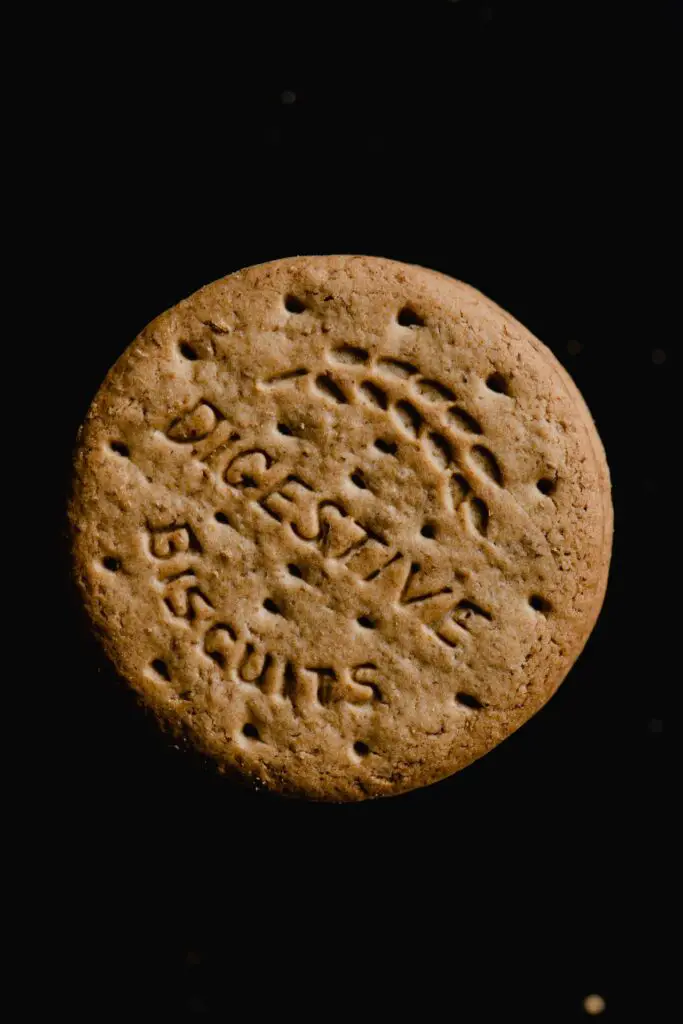We’ve learnt to keep any biscuits and cookies shut away in the cupboard. The days when we could leave half a packet out on the side ended once we got our dog. He’s something of a snack snaffler. Over the years, he’s eaten a few things that he shouldn’t have. We’ve been lucky that it’s never been anything serious, but it has made us more careful. What’s harmless to us could make our dog very sick, so we try and do our research. A recent shopping trip spurred today’s question. We wanted to find out – can dogs eat digestive biscuits?
As always, we’re not veterinarians and this should not constitute veterinary advice.
What are Digestive Biscuits Made From?
Check the ingredients before giving your dog anything that’s made for humans. Preservatives and sweeteners may be safe for us but they can be dangerous for pets to eat. Xylitol is the big one to watch out for. Found in many sugar-free foods, it’s very toxic to dogs and can kill them.
Fortunately, xylitol isn’t in McVities digestive biscuits but get into the habit of checking. Xylitol appears in some surprising products including peanut butter, jam, and jelly. Always be suspicious of anything that’s sugar-free.
Can Dogs Eat Digestive Biscuits?
Nothing jumps out as being dangerous in McVities biscuits. They contain Flour (55%) (Wheat Flour, Calcium, Iron, Niacin, Thiamin), Vegetable Oil (Palm), Wholemeal Wheat Flour (16%), Sugar, Partially Inverted Sugar Syrup, Raising Agents (Sodium Bicarbonate, Malic Acid, Ammonium Bicarbonate), Salt.
Remember, other manufacturers may sell a similar branded product but use different ingredients. Always check to make sure they haven’t added anything harmful.
Plain Digestives are OK but DON’T feed your dog chocolate digestive.
Chocolate is toxic.
Whilst there isn’t a huge amount in the coating, it doesn’t take much for a dog to get sick. If you suspect your dog has eaten a chocolate digestive, call a veterinarian. They can help you find out whether your dog is at serious risk. It helps to have the packet in front of you as well as your dog’s weight and the amount they’ve eaten.
Don’t let dogs with wheat sensitivity eat the biscuits either. There’s both wheat and wholemeal flour included in the ingredients. Both can cause a stomach upset for pets that are grain intolerant.
One or two digestives every so often is unlikely to cause any harm to a dog. Think of these biscuits as an occasional treat. Don’t get into the habit of feeding them one regularly. Whilst they’re not toxic, they don’t provide any nutritional benefit to the dog.
What’s more, there are around 70 calories in a single biscuit. The recommended calorie intake for a 20-pound dog is between 325 and 400 calories. 70 calories are, therefore, quite a lot relative to what else they’ll be eating during the day. High-calorie diets are bad for dogs. Diabetes, cardiovascular problems, and obesity are all linked to them. These are life-limiting conditions that can also produce expensive veterinary bills. What’s more, the sugar and syrup in these biscuits also aren’t good for a dog’s teeth.
Treats like these should be occasional. There are other ways to reward your dog without undermining its health. Reward your dog with plain yoghurt (check for xylitol first) and a few strawberry leaves. They like canary melon, too. Try mashed carrot as well.
Be selfish and don’t share biscuits with your dog because, after all, they don’t share theirs with you ;p

